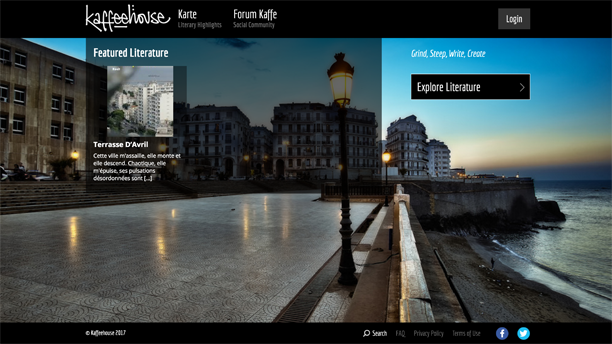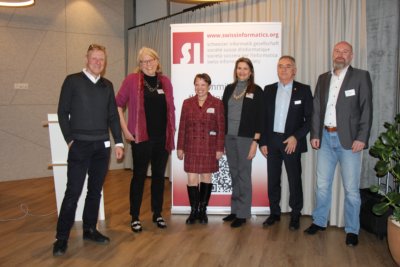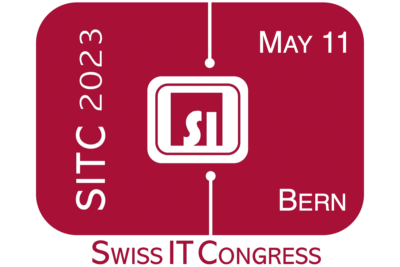To support the creation of cultural assets it is necessary to provide spaces of dialogue and exchange. This is equally important for science and arts. An example of this is the post world war one era known as Viennese Modernity or Wiener Moderne in which cultural post world war friction discussed and formed in Viennese coffee houses resulted in visual art (Klimt), Literature (Hofmannsthal) and Science (Vienna Circle, Freud etc.). A further indicator for the creation of cultural value was the inclusion of many different languages in one place. Again in the time of the viennese modernity it was common for individuals to speak more than one language which added to the multi cultural melting pot. The Viennese coffeehouses therefore created a forum and space in which creative innovation was possible. It can be argued that this innovation is a product of dialogue within these cultural spaces.
We introduce the Kaffeehouse Platform as an online and hence globally connected version of this idea.The name of the platform is based on a German-English word play with Kaffee meaning Coffee in english and House meaning Haus in German. The purpose of this dual lingual name is to reflect the multilingual nature of the Kaffeehouse Platform. Hence the Kaffeehouse platform seeks to reincarnate the multicultural and multilingual space, known as the Viennese coffeehouse culture, within a digital and globally accessible online platform and with a specific focus on short form text and crowd sourced translations.
The explosion of digital content has dramatically changed the value capture for global publishers. Internet users’ willingness to pay for books, magazines and newspapers has dropped significantly and media companies recognize that they must adapt to user demands and cultivate online customer relationships to stay competitive. Platforms like Oyster (https://en.wikipedia.org/wiki/Oyster_(company)), Scribd (https://www.scribd.com/) and Genius (http://genius.com/) have shown exactly how publishing houses are willing to accept a new ecosystem and find new ways to profit from the growth of the Ebook market (roughly 14.5b$ (http://www.publishingtechnology.com/2014/12/kobo-thinks-the-global-ebook-market-is-worth-14-5bn-but-what-do-other-sources-say/)).
However, a new publishing ecosystem presents challenges for smaller players, and it remains difficult to navigate the gaps between major conglomerates and smaller independent publishers. As a result, European, African and Asian publishers often fail to reach wider global audiences, and the inefficiency and the lack of reliable market projections makes the value chain a slow and corrigible process. There are two reasons that can be identified: 1) Lack of market access and 2) Lack of translations. It is the mission of Kaffeehouse to achieve both and to ensure more literature is brought to more people in more languages.
Kaffeehouse does this by helping publishers across the industry anticipate market demands and provides access to a greater supply of global literature. By breaking down linguistic barriers, Kaffeehouse matches translation talent with industry needs within one easy to use platform. To ensure content quality Kaffeehouse works with independent global publishers and freelance translators. The Kaffeehouse platform allows translators to transmit a translation in any target language and if needed in multiple languages. Because Kaffeehouse focuses on short form text the translation task is simple to execute and not time consuming.
Currently, Publisher Users coordinate with Kaffeehouse Administrators to upload content on the Kaffeehouse Dashboard. This requires numerous email and phone correspondences across Asia, Africa and Europe. The Publisher User then delivers the content to a Content Admin (through Dropbox since file sizes can be extremely large) who must scale it for size limitations and upload it onto a Kaffeehouse staging site. The Publisher User then reviews the content before Publication. Consequently, since the concept of enhancing literary texts with media files, links and annotated material is new, Publisher Users do not have all relevant files and must rely upon Content Admins to search the web for material related to the Publisher, Author, or Source Content. This information is then submitted to the Publisher User for approval. In total, this process takes the Content Admin roughly 8-12 hours to retrieve Open Data information per source text with a downtime for Publisher consent between 1 and 3 days. Semi-automated, Kaffeehouse believes this process could be shortened to 30 minutes to 1 hour and could allow the Publisher to take a more direct role in uploading content that can be shared as Open Data.
Kaffeehouse skirts a line between translation publishing and digital language learning market. A platform for learning, it belongs to the Education Tech industry and Language Learning segment. As an open-source translation site, it complements the Independent Publishing market, and as a translation data and library provider it belongs to the translation industry.










